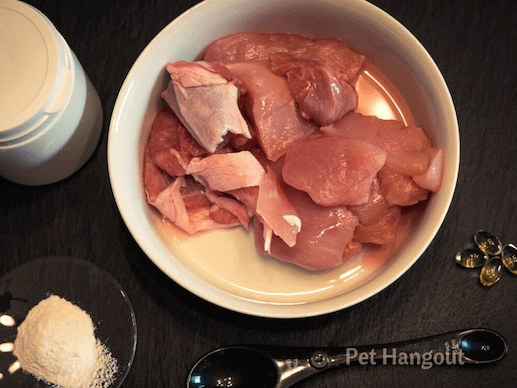Your shopping cart is empty!
MENU
- +
- Pet Lovers +
-
Cool Dogs+
-
Cool Cats+
- Grooming +
-
Health & Safety+
-
Home or Travel+
- +

Adverse reactions to food aren’t really fun for anyone. It is even worse for your dog because they can't explain what they are going through.
Food allergies or intolerances are bad chemical reactions to a certain food substance that takes place in your pet's body.
It usually takes some time for your dog's body to develop a negative reaction to certain food elements. Even though both allergies and intolerance are adverse reactions to food, they happen due to different reasons altogether. The term allergy is often used to describe both of these reactions. But a real food allergy is quite a rare occurrence.
So you must understand the difference between the two, in case your dog ever has to face the issue.
Allergy vs Intolerance
Food allergy is the term used to refer to only one kind of reaction, which usually stems from the dog's immune system.
It is the immune system that responds to a particular allergen that the dog's body was previously exposed to. The reaction is because the dog's immune system is trying to develop antibodies to a certain protein that might be harmful to your dog.
It can take a very long time for your dog to develop an allergy to a certain food element. But once your dog's immune system has established a negative reaction to that element, your dog will always have the same reaction to it.
Food intolerance is a much more common occurrence and it is not triggered by the dog's immune system.
Food intolerance shows adverse effects the first time your dog has difficulty digesting a particular element in its food. However, the body's reactions are similar in both the scenarios because there are limited ways in which a dog's body can show the problem.

The treatment of the two scenarios varies from each other.
Allergies are usually treated with medication and diet restrictions whereas intolerance is dealt with diet modifications alone.
Veterinarians may give your dog a shot for its allergy whereas in case of a grain intolerance they might suggest Dr. Gary's Best Breed Chicken With Fruits Vegetables Dry Dog Food.
Identifying the Symptoms
Allergies can either affect their skin or their digestive system.
But food intolerance would harm the digestive system only.
If your dog is suffering from frequent bouts of diarrhea, vomiting, or flatulence, they might be having an allergy or intolerance to a particular food.
But a skin complication can be caused by an allergen. Allergic reactions on the skin might look like a flea-bite or dermatitis. They might also occur as chronic ear infections.
The common symptoms of an allergy are:



If you notice any of these symptoms or a pattern in these, you may want to take your dog to the vet and let them undergo a series of tests to narrow down the issue. On the other hand, there are at-home tests you can order to do your own troubleshooting to identify the irritant(s).
If your dog doesn't appear to be seriously threatened (like trouble breathing) with the reaction, it might be more cost-effective to have a go at one of the pet tests on 5strands.com They offer testing for dogs, cats, horses, and people! Check out some of the pet case studies and see if any of these course of actions seem right for your furbaby.
If you are charting the course of the process of food elimination, it can take up to weeks to understand the root of the problem and might take even longer to find the source. Usually, it takes about 8-10 weeks of feeding data to identify the problem and work out a diet chart for your dog.
Allergies in dogs can be inherited from their parents too.
With all of this being said, a lot of pet parents turn to raw feeding to give their pets the highest nutrition minus the allergens and irritants that are found in so many pet foods. If you are curious about this avenue, this Raw Feeding Primer is a must-read for you! They say once you feed a dog raw, you will never go back to kibble. There are huge benefits of this feeding style!!

Most Common Allergens
Meat
Meat proteins are one of the most common food allergens.
Meat is usually the prime ingredient in most dog foods, which is probably why its intolerance may be more common. However, your dog could be allergic to one kind of meat and not all of them.
That's why rotating different animal proteins is important in a dog's diet to identify the allergen and then avoid that one.

Dairy
Some dogs might face problems digesting lactose. This is an intolerance to cow's milk.
Lactose intolerance has the same effects in dogs as in humans like flatulence, vomiting, or diarrhea. However, dogs might also be allergic to dairy, which can result in similar symptoms or skin complications.
This makes it difficult to distinguish between a dairy allergy and lactose intolerance.

Carbohydrates
It is often a misconception that all dogs have an intolerance towards Carbohydrates, especially grains, and should be fed a meat-only diet. However, meat allergies are more common than grain allergies in dogs.
Still, there are chances that your dog might actually be allergic to grains and must be checked individually by your vet.

Eggs
Dogs can be often allergic to the proteins in the egg yolk. If your dog is allergic to eggs, look out for eggs on the dog food labels and your dog should be fine.

Soy
Soy can cause health problems beyond allergies or intolerance in dogs.
Some studies claim that they might affect your dog's reproductive system or growth. So it is probably advisable to avoid soy altogether in your dog's diet.

SUMMARY
There is a big difference between Food Allergies and Food Intolerances for your dog.
Allergies are your dog's immune system trying to respond to an allergen that isn't blending well with your dog's system. Intolerance is a response to your dog's internal digestive system.
Both can cause sickness and undesirable symptoms for your pooch. It may take weeks to troubleshoot and figure out what is going on with your dog. One course of action is to take your dog to their Vet so that they can test them for allergies and gain a proper diagnosis. Another avenue is to invest in your own testing kit to help troubleshoot the issue.
Once the problem/irritant/allergen is identified, avoid feeding them to your dog. You can also ask your veterinarian to prescribe certain dog foods or work with a pet nutritionist to make homemade food for your dog. And some pet parents even take the plunge into raw feeding to ensure the highest of quality goes into every bite their pet takes in!
Persist through the symptoms and we know you will get your pet back on track with good health and happy times for many years to come!

Your Pup or Kitty suffering from food intolerances?
Tell us all about it below...we would like to help!
For more Pethangout healthy pet reads, check out How to know what Normal when Your Cat is Throwing Up, Why is My Poor Dog's hair Falling Out, and 15 Sure Fire Solutions for Calming down Itchy Flea Bites.